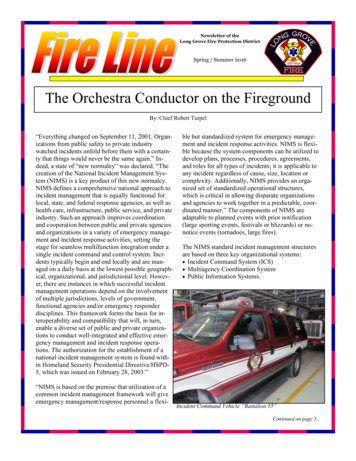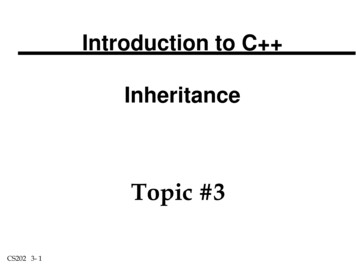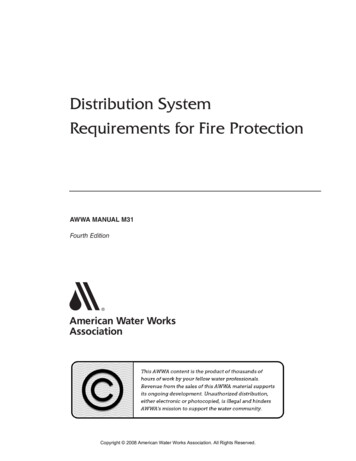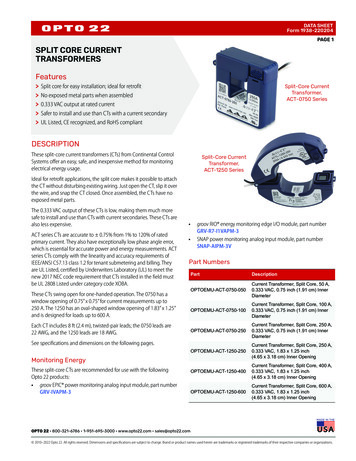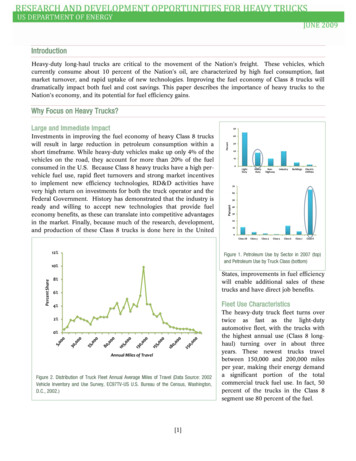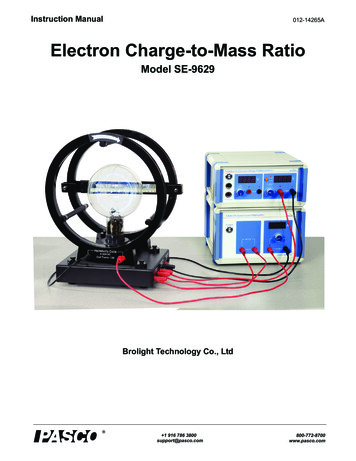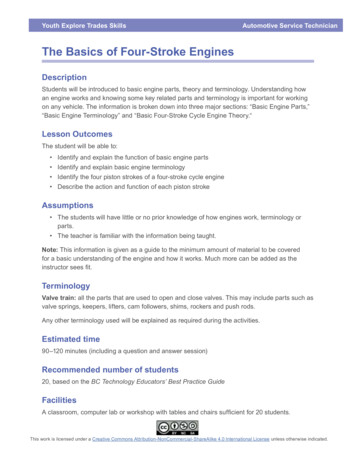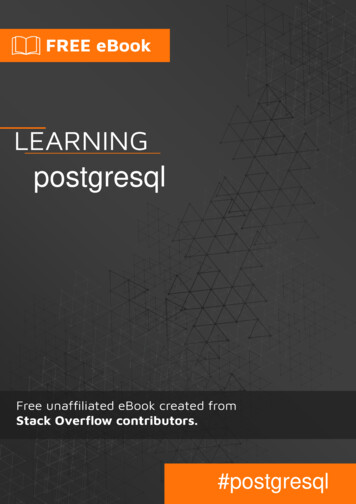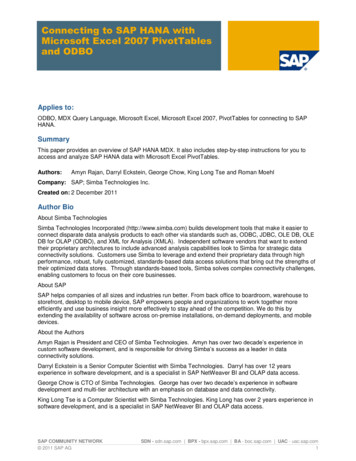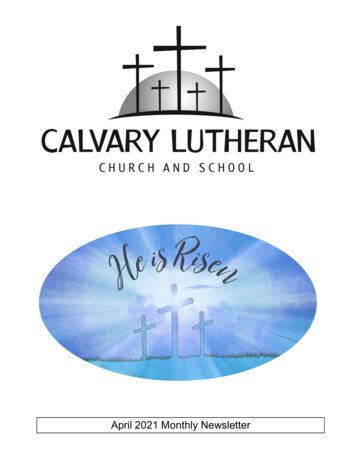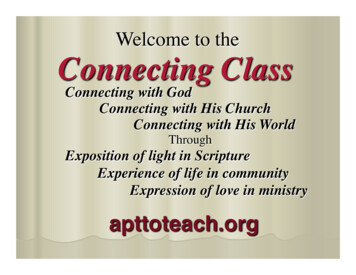
Transcription
Welcome to theConnecting ClassConnecting with GodConnecting with His ChurchConnecting with His WorldThroughExposition of light in ScriptureExperience of life in communityExpression of love in ministryapttoteach.org
The John RylandsFragment117-138 C.E.John 18:31-33The earliestknown copy ofany portion ofthe NewTestament
N.T.writtenO.T.written1500 B.C. 1000 B.C.500 B.C.093% of allBiblical MSSare dated after900 C.E.500 C.E.1000 C.E.1500 C.E.Codex Sinaiticus 331 C.E.Codex Vaticanus 350 C.E.Codex Alexandrinus 450 C.E.
The structure of the New 4 B.C.33 C.E.45 C.E.100 C.E
The time line of the New TestamentMatthewMarkLukeLife of JesusLetters of Paul4 B.C.E.-30 C.E.50-60 C.E.John65-85 C.E.95 C.E.
How are we to respond toLiberalHistorical CriticalScholarshipwhen it discredits the authority ofthe Bible?
TheGospelThe integrity of themessenger affectsthe message.George thesalesman“Just trust meon this one.”ThebankerThecourthouse“George hasa bad record.”The BibleThe Critic“It’s not asbad as itseems.Therest”ofthe story
Assumptions of the Liberal Historical Critic.ü The historian seeks a rational, natural,and common explanation.ü The historian is skeptical of tradition,dogma, and claims of the supernatural.ü Error #1 There is no truth beyondwhat can be explained naturally.ü Error #2 We must explain everythingnaturally even if we have to useimaginary data or distort the data.ü Error #3 Faith isirrational and foolish.
Error #4. “The Gospel canbe explained fully fromnatural cultural sources.”JewishtraditionGreco-RomanCultureNeed forsecurityMysteryCultsJesus asthe nalPsychologicalexperiences
Error #5. “The N.T. evolved throughthe creative activity of the earlychurch.”?. . . becameThehistorical the Christoffaith.Jesus . . .We know veryThe earlylittle about the church inventedhistoricalJesus as theJesus.Christ. . . recordedin theGospels.The Gospelswere written tosupport thetheology of theearly church.
Error #6. “There were originally manydifferent forms of nitesGnosticsJohn?xyodoOrthMany versionsof ChristianityPaulMysteryCultsChurchFathersJudaizers
Did the earliest Christian communitiesreflect the orthodoxy of the Gospels?Hypothetical “Q”The Gospel of ThomasMaterial common to Matt. A 2nd Cent. Gnostic& Lk. but not in Mk.documentü No mention of Jesus’ deathand resurrection.ü No emphasis on Jesus’ deity.The Critic’s Conclusion - Many earlyfollowers of Jesus did not center theirfaith on the cross & resurrection.
The weaknesses of the HistoricalCritical method.ü It is an infant “creative” science.ü It is influenced by fads.ü It has a poor track record.ü Its presuppositions are too restrictive.ü It refuses to admit its own bias.ü It make too much of too little.ü It wants to have its cake and eat it too.
“It is not merely that the Bible isn’t readfrom the perspective of faith, it isn’teven read from the perspective of thepossibility of faith.” To make matterseven more difficult for those of faith,many institutions of higher learningaggressively socialize students withunqualified or justified pressure fromexpressionslike,“obviously,” “ofcourse,” “everyone now knows,” “allscholars agree that.”Eta Linnemann (a former eminent historical critic)
How do evangelical Christiansunderstand the origin of the N.T.ü The NT documents wereidentified as inspired by God’sSpirit through Apostles or theirclose associates fairly soon afterthey were written.ü The early church identified (notinvented) the N.T.
II Timothy 3“15 and that from childhood you haveknown the sacred writings, whichare able to give you the wisdom thatleads to salvation through faith whichis in Christ Jesus. 16 All Scripture isinspired by God and profitable forteaching, for reproof, for correction,for training in righteousness; 17 thatthe man of God may be adequate,equipped for every good work.”
Hebrews 1:1“God, after He spoke long ago tothe fathers in the prophets in manyportions and in many ways, in theselast days has spoken to us in HisSon, whom He appointed heir of allthings, through whom also He madethe world.”
II Peter 3“15 and regard the patience of our Lord {to be}salvation; just as also our beloved brotherPaul, according to the wisdom given him,wrote to you, 16 as also in all {his} letters,speaking in them of these things, in which aresome things hard to understand, which theuntaught and unstable distort, as {they do}also the rest of the Scriptures, to their owndestruction.”
II Peter 1:16“We did not follow cleverlyinvented stories when we toldyou about the power and comingof our Lord Jesus Christ, but wewere eyewitnesses of hismajesty.”
II Peter 1:21“for no prophecy was ever made byan act of human will, but menmoved by the Holy Spirit spokefrom God.”I Corinthians 2:13“which things we also speak, not inwords taught by human wisdom,but in those taught by the Spirit,combining spiritual thoughts withspiritual words.”
The unnatural origin of Christianity.ü Its origin is dramatic, fast and certain (notevolved).ü The doctrine of the resurrection wasestablished early.ü Christianity started in an obscure cornerof the Roman empire.ü Jesus’ ministry was short, local, andwithout writing.ü The hostility against Christianity wasunusual in Rome.ü It was dangerous to be a Christian.
It is reasonable to believe the N.T.writers were speaking the truth.ü They included embarrassing details aboutthemselves.ü They included embarrassing details and difficultsaying of Jesus.ü They left in demanding saying of Jesus.ü They distinguished Jesus’ words from their own.ü They included events related to the resurrectionthat they would not have invented.ü They challenge their readers to check their facts.ü They describe miracles as historical events.ü They abandoned their long-held beliefs to followtheir message.
The challenge to Biblical authority- four reactionsThe challenge toBiblical authorityLiberalismReasonwithout faithNeo-orthodoxyFaith separatedfrom reasonFundamentalismFaith withoutreasonEvangelicalismFaith and reason
Big questions for critics!How honest and secure are youwith your conclusions?How do you explain the“resurrection of Jesus”?What basis for your soul’s hopedo you have if this messagecannot be trusted?
What should be our posture towardLiberal Historical Critical challenges?ü Be informed. Get your facts straight.ü Be humble. Don’t be afraid to admityou don’t have all the answers.ü Be reasonable. Recognize whereyou have a point to make and wherethey may have a valid point.ü Don’t demand too much. Realizethat faith does not demand absolutecertainty but reasonable probability.
A 2nd Cent. Gnostic document The Critic's Conclusion - Many early followers of Jesus did not center their faith on the cross & resurrection. Hypothetical "Q" Material common to Matt. & Lk. but not in Mk. Did the earliest Christian communities reflect the orthodoxy of the Gospels?! No mention of Jesus' death and resurrection.!


